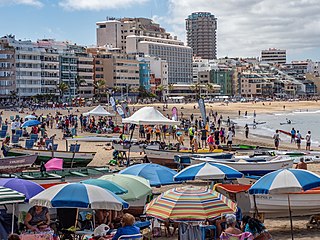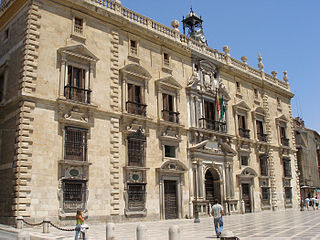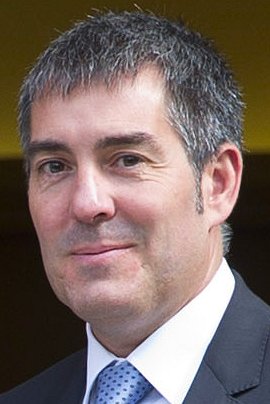Related Research Articles

The Canary Islands, also known informally as the Canaries, are a Spanish region, autonomous community and archipelago in the Atlantic Ocean. At their closest point to the African mainland, they are 100 kilometres west of Morocco and the Western Sahara. They are the southernmost of the autonomous communities of Spain. The islands have a population of 2.2 million people and are the most populous special territory of the European Union.

The Province of Las Palmas is a province of Spain, consisting of the eastern part of the autonomous community of the Canary Islands. Las Palmas de Gran Canaria, capital city of this province and of the island of Gran Canaria, is the largest city in the Canary Islands.

Las Palmas, officially Las Palmas de Gran Canaria, is a Spanish city and capital of Gran Canaria, in the Canary Islands, in the Atlantic Ocean.

Gran Canaria, also Grand Canary Island, is the third-largest and second-most-populous island of the Canary Islands, an archipelago off the Atlantic coast of Northwest Africa and is part of Spain. As of 2023 the island had a population of 862,893 that constitutes approximately 40% of the population of the archipelago. Las Palmas de Gran Canaria, the capital of the island, is the biggest city of the Canary Islands and the ninth of Spain.

The Supreme Justice Tribunal is the highest court of law in the Bolivarian Republic of Venezuela and is the head of the judicial branch. As the independence of the Venezuelan judiciary under the regime of Nicolás Maduro is questioned, there have recently been many disputes as to whether this court is legitimate.

The Supreme Court is the highest court in the Kingdom of Spain. The court has original jurisdiction over cases against high-ranking officials of the Kingdom and over cases regarding the legalization of political parties. It also has ultimate appellate jurisdiction over all cases. The Court has the power of judicial review, except for the judicial revision on constitutional matters, reserved to the Constitutional Court.

Jerónimo Saavedra Acevedo was a Spanish politician and academic. He served as President of the Canary Islands twice, from 1983 to 1987, and again from 1991 to 1993.

The Judiciary of Spain consists of Courts and Tribunals, composed of judges and magistrates (Justices), who have the power to administer justice in the name of the King of Spain.

The High Court of Justice of Andalusia, Ceuta and Melilla, is the highest court of Andalusia, and for the Spanish autonomous cities of Ceuta and Melilla. Its seat is the former Royal Chancery of Granada. The TSJA has full power over all the jurisdictional orders: civil and penal law, social law, administrative disputes, and any other orders that may be created in the future.
The Supreme Court of Justice is the highest court of ordinary jurisdiction in Bolivia, based in Sucre. Its powers are set out in Articles 181–185 of the 2009 Constitution and the Law of the Judicial Organ. It was first seated on 2 January 2012.

The 2015 Canarian regional election was held on Sunday, 24 May 2015, to elect the 9th Parliament of the Autonomous Community of the Canary Islands. All 60 seats in the Parliament were up for election. The election was held simultaneously with regional elections in twelve other autonomous communities and local elections all throughout Spain.

The High Court of Justice of Castile and León, is the superior and appellate court of the Judiciary of Spain in the territory of the autonomous community of Castile and Leon, notwithstanding its original jurisdiction in some cases, and the jurisdiction of the Supreme court. Located in Burgos, the court is divided into the Civil, Criminal, Administrative and Labour (Social) chambers. The High Court is also tasked with the resolution of jurisdictional conflicts between the courts in Castile and León.

The superior courts of justice, or high courts of justice, are courts within the judicial system of Spain, whose territorial scope covers an autonomous community, as laid down in the Organic Law of Judicial Power.

The High Court of Justice of Catalonia is the highest body and last judicial instance of the Spanish judiciary in Catalonia. Unlike the Parliament of Catalonia or the Executive Council of Catalonia, the TSJC is not a part of the Generalitat of Catalonia, the autonomous system of self-government of the community, although the Catalan government has some powers over it, especially in material resources.

The High Court of Justice of Cantabria (TSJC), is the highest court of the Spanish judiciary in the Autonomous Community of Cantabria. Established pursuant to Title VIII of the Spanish Constitution, it has original jurisdiction over cases against high-ranking officials of the autonomous community and appellate jurisdiction over all cases. The TSJC decisions may be appealed to the Supreme Court. It also has entrusted the resolution of conflicts of competence between courts in Cantabria. The Court has the power of judicial review over norms with lower rank than the law of the regional administrations.
The Office of the Public Prosecutor was created in the Autonomous communities of Spain by Royal Decree 1754/2007 of December 28.
The Supreme Tribunal of Justice of Venezuela (TSJ) in exile is an institution that some, including the Organization of American States, consider to be the legitimate highest court of law in Venezuela and the head of the judicial branch, as opposed to the Supreme Tribunal of Justice. It was established on 21 July 2017 following the 2017 Venezuelan constitutional crisis. The TSJ's 33 members have been based in Chile, Colombia, Panama, and the United States due to the political crisis in Venezuela.
As in the rest of Spain, the majority religion in the Canary Islands is the Catholic Church. The Catholic religion has been the majority since the Conquest of the Canary Islands in the fifteenth century. This religion would largely replace the Canarian aboriginal religion through the prohibition of the latter and syncretism. According to a survey conducted in 2019, Canary Islands is the fifth autonomous community in Spain with the highest percentage of people who declare themselves to be Catholics after the Region of Murcia, Extremadura, Galicia, Aragon, and Castile and León. 76.7% of the population is Catholic.

The High Court of Justice of Castilla-La Mancha is the highest body of the judiciary in the autonomous community of Castile-La Mancha (Spain). It is headquartered in the city of Albacete.

The High Court of Justice of Extremadura is the highest body and last judicial instance of the Spanish judiciary in Extremadura. Unlike the Assembly of Extremadura or the Government of Extremadura, the TSJEx is not a part of the Junta de Extremadura, the autonomous system of self-government of the community, although the Extremaduran government has some powers over it, especially in material resources.